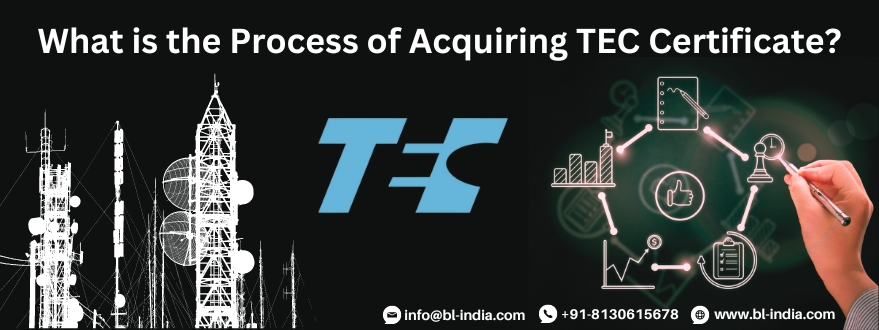
In the telecommunication industry, compliance with national standards is essential. In India, the Telecommunication Engineering Center (TEC) plays a pivotal role in ensuring that telecom equipment meets the necessary criteria for quality and safety.
TEC's meticulous standards and rigorous testing procedures serve as the backbone of India's telecommunications infrastructure, guaranteeing seamless connectivity and reliable service delivery across the nation. It signifies adherence to stringent quality benchmarks and demonstrates a commitment to meeting the evolving needs of consumers and stakeholders.
If you're a manufacturer or importer of telecom products in India, obtaining a TEC certificate is a legal requirement and a mark of credibility. This blog explains the step-by-step guide to demystify the process of obtaining a TEC certificate in India.
The Telecommunication Engineering Center is the authoritative body in India entrusted with the certification of telecommunication products, operating in alignment with the Mandatory Testing Certification of Telecommunication Equipment (MTCTE) regulations. Under the Indian Telegraph Amendment Regulations of September 5, 2017, it is mandatory that all telecommunication equipment must undergo compulsory testing and certification before being made available for sale, import, or utilization in India.
This stringent requirement underscores the nation's commitment to ensuring the quality, safety, and interoperability of telecommunication equipment deployed across its vast landscape. TEC's role extends to overseeing the comprehensive testing process conducted by accredited laboratories designated by TEC itself. These laboratories rigorously assess the equipment's conformity to Essential Requirements (ER) as outlined by regulatory standards.
Upon successful completion of the testing phase and the submission of requisite test reports, TEC issues the coveted TEC certificate, serving as tangible proof of the equipment's compliance with Indian regulatory standards. Through its robust certification framework, TEC plays a pivotal role in safeguarding the integrity of India's telecommunications infrastructure and fostering consumer confidence in the products and services offered within the sector.
The Telecommunication Engineering Center covers a range of pivotal responsibilities within India's telecommunications landscape:
All manufacturers and importers are required to obtain TEC certificate for their telecom products in India due to several compelling reasons:
Several telecommunication products fall under the mandatory product list of TEC Certification. These include:
And many more.
TEC certification can be applied by manufacturers or authorized representatives of telecommunications equipment or products intended for use within India. This certification process ensures adherence to mandatory technical and safety standards before the equipment is made available in the Indian market.
Eligible applicants are required to submit a comprehensive application form, along with relevant documentation, such as testing reports and technical specifications of the equipment or merchandise, to initiate the TEC certification process.
To qualify for TEC certification, manufacturers seeking approval for the sale of telecom equipment in India must meet stringent eligibility criteria, which include:
Several crucial documents are essential when applying for a TEC certificate, including:
The application procedure for obtaining a TEC certificate involves several steps:
Step 1: Gather all necessary documentation for the application.
Step 2: Complete the application form provided by TEC, ensuring all required information is accurately filled out.
Step 3: Compile and submit all required documents along with the application form. Ensure that the documentation meets TEC's requirements and standards.
Step 4: TEC conducts a thorough technical evaluation of the equipment based on the submitted documentation and test reports.
Step 5: Upon successful completion of the technical evaluation, TEC issues the TEC certificate, confirming compliance with regulatory standards.
TEC Certificate signifies that the equipment meets the necessary criteria for sale, import, or use in India.
In conclusion, navigating the process of obtaining a TEC certificate in India is a crucial requirement for manufacturers and importers looking to market their telecommunications products legally and seamlessly in the country. However, the process can often be complex and daunting, requiring meticulous attention to detail and a thorough understanding of regulatory nuances.
This is where Brand Liaison, a trusted compliance consultancy, comes into play. With its expertise and experience in facilitating TEC certification, Brand Liaison offers invaluable assistance and support to manufacturers and importers, streamlining the certification process and ensuring prompt approval.
By partnering with us, they can navigate the regulatory landscape with confidence, avoiding legal penalties and restrictions while swiftly bringing their products to market. With Brand Liaison by their side, manufacturers and importers can embark on their journey to obtaining TEC certification with ease and efficiency, unlocking the vast potential of the Indian telecommunications market while upholding the highest standards of quality and compliance.